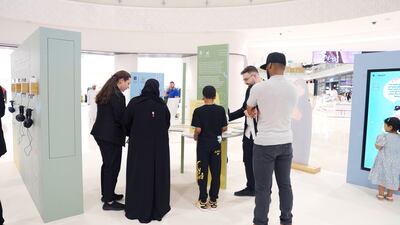More than Dh12 million has been allocated to early-years projects in Abu Dhabi in the last three years.
The emirate's Early Childhood Authority (ECA) has funded 18 projects on topics including the role of fathers in child development, atypical language development in Emirati children, and causes of absenteeism in schools.
Now the authority has launched an awareness campaign to develop a thriving research culture and ecosystem.
The campaign, announced in September, included community events in Abu Dhabi, Al Ain and Al Dhafra.
The activities, held at venues including Yas Mall, Khalifa Park Library and Umm Al Emarat Park, aimed to give parents fresh insight into the ECA's key work.
The continuing initiative aims to attract people from different walks of life to carry out research in early childhood development, which covers birth to eight years old.
The authority will also launch its annual call for grant proposals before the end of the year, inviting researchers to submit their ideas for funding. A launch date is yet to be announced.
Embracing technology
“We're trying to boost early childhood development research, not only in the usual disciplines like psychology, education and paediatrics, but we are also exploring others such as artificial intelligence and engineering,” said Hamda Al Suwaidi, head of data and research at ECA.
“We aim to encourage research in critical areas in early childhood development. This includes everything from informing how governments develop programmes and policies related to child development to how parents and caregivers care for children daily.”

Ms Al Suwaidi said the hope is to encourage better research and bring it into the government sector so policies and programmes are build on rigorous studies.
The ECA has organised workshops with Mohamed Bin Zayed University of Artificial Intelligence and Zayed University to explore new methods of collaboration between government and academia.
“In the last grant cycle, we had 10 research groups, researching fathers and their experiences as parents, and how fathers should engage with their children and what's the effect,” Ms Al Suwaidi said.
“We focused on fathers because research worldwide focuses on mothers a lot, while the research on fathers is very scarce.”
Their primary challenge, Ms Al Suwaidi added, was research allocation and co-ordination. The core of their campaign is to bridge the gap between government, academia and the community.
“We're looking at child protection, nutrition, early education and development,” Ms Al Suwaidi said.
She explained that people from many backgrounds can research early childhood development.
“You can have a machine learning background and you work on something in education. You can be in engineering and create something for the health of children. You don't need to be a doctor or you don't need to be in healthcare to research healthcare. That's how research and collaboration happens and flourishes as there's a lot of different points of view.”
ECA organised a research retreat on October 31, followed by a government round-table discussion on November 1.
The participants discussed how to foster and strengthen partnerships across academic disciplines and sectors related to early childhood development.
“These studies and research projects support the emirate's health policies – especially for our youngest children – with clear and verified scientific evidence,” said Noura Al Ghaithi, Undersecretary at the Department of Health.
“Creating a robust and integrated early childhood development research ecosystem can result in new solutions, approaches, and technologies that support the Department of Health's efforts to provide the community with high levels of quality and reliability,” she said.


